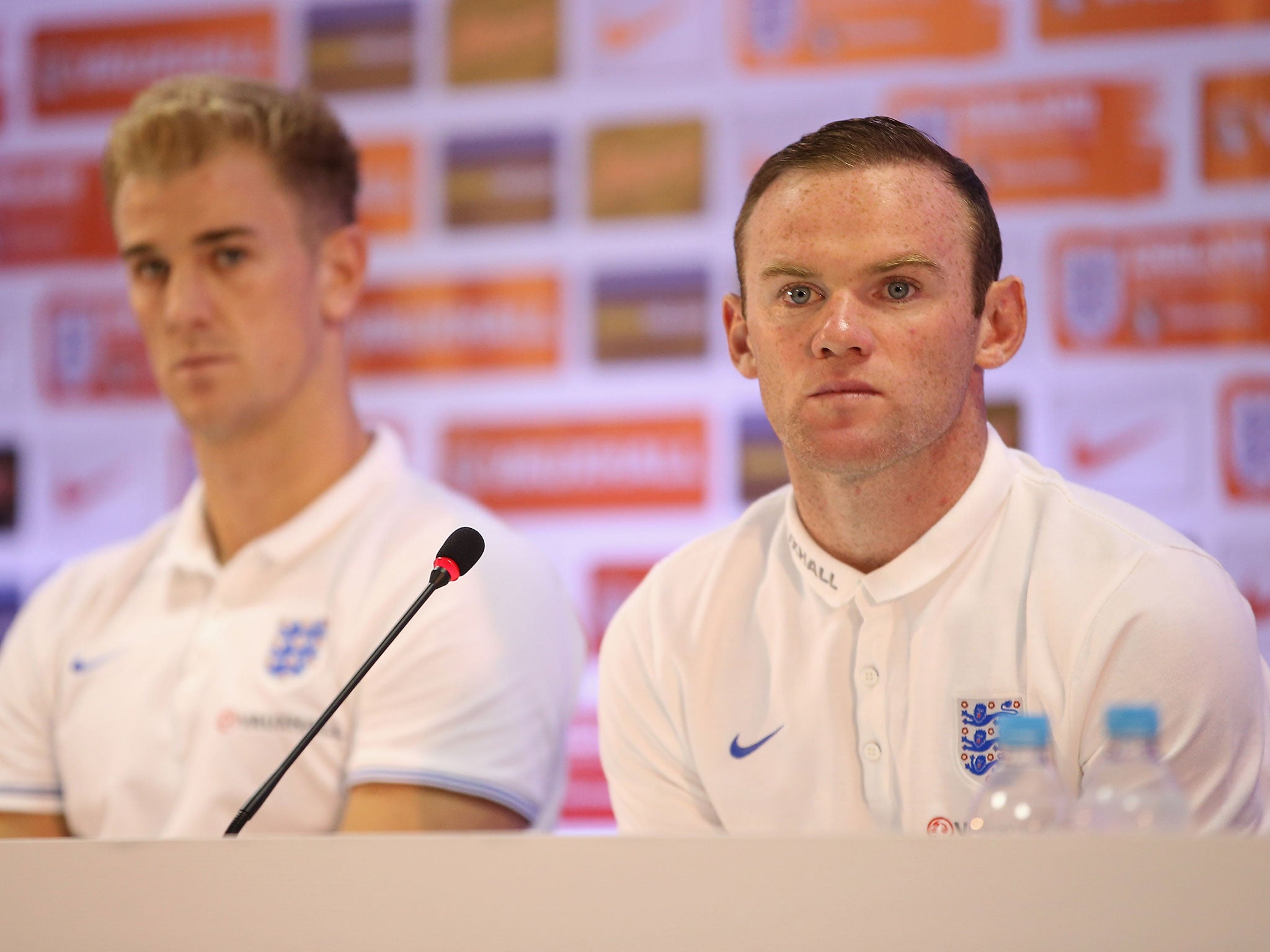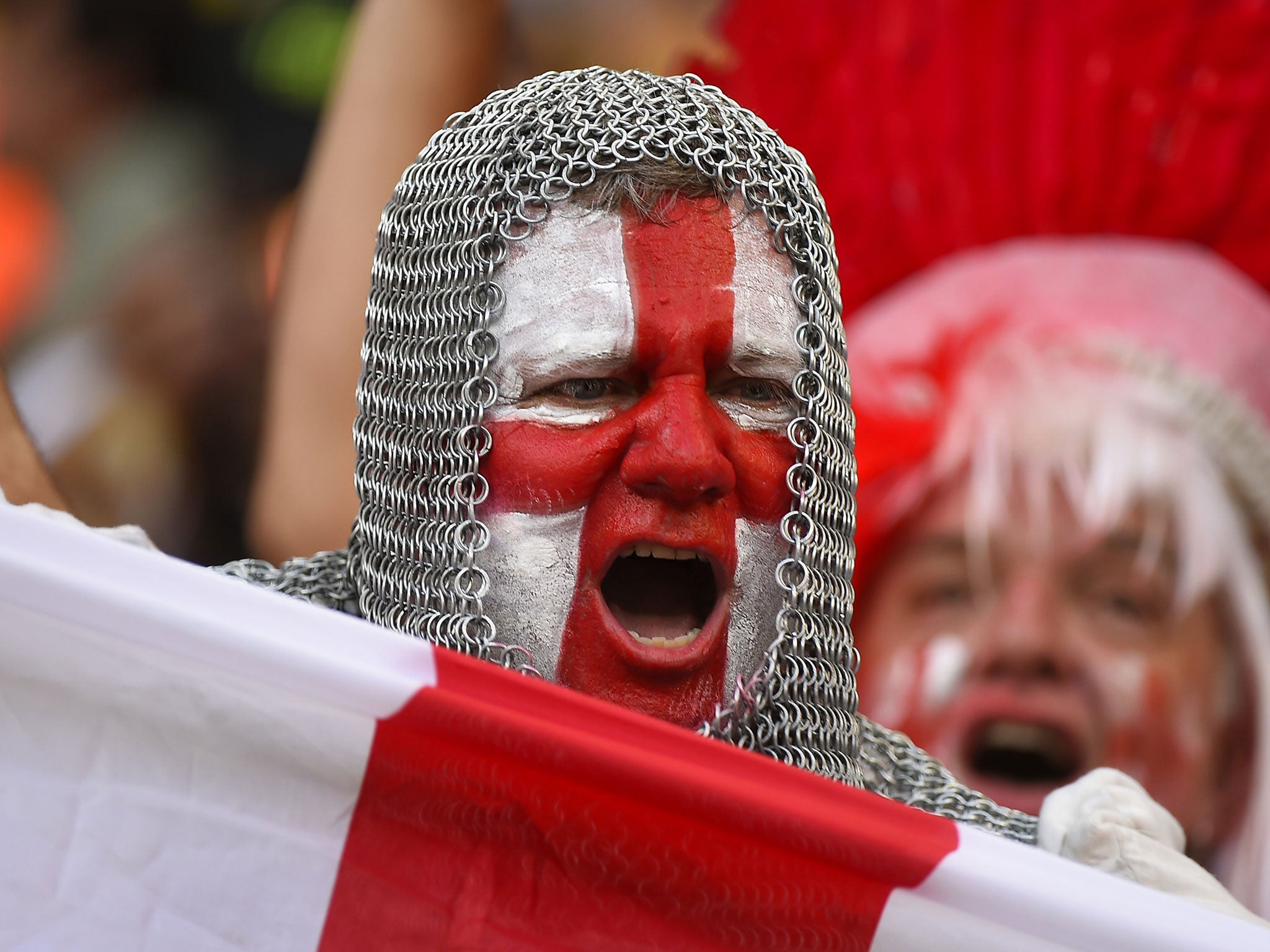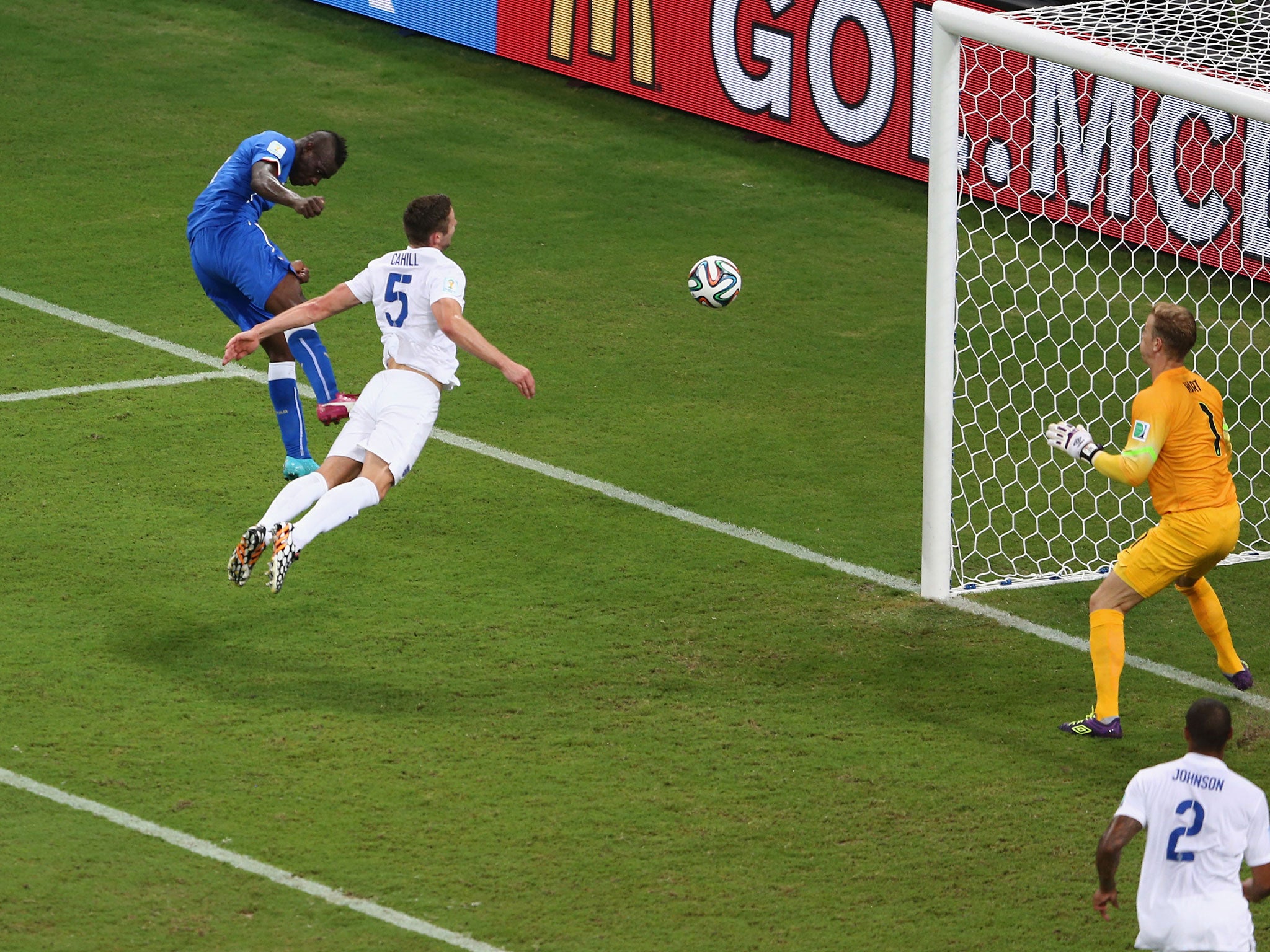England OUT of World Cup 2014: Footballing glory no closer for England than it has been in decades

Your support helps us to tell the story
From reproductive rights to climate change to Big Tech, The Independent is on the ground when the story is developing. Whether it's investigating the financials of Elon Musk's pro-Trump PAC or producing our latest documentary, 'The A Word', which shines a light on the American women fighting for reproductive rights, we know how important it is to parse out the facts from the messaging.
At such a critical moment in US history, we need reporters on the ground. Your donation allows us to keep sending journalists to speak to both sides of the story.
The Independent is trusted by Americans across the entire political spectrum. And unlike many other quality news outlets, we choose not to lock Americans out of our reporting and analysis with paywalls. We believe quality journalism should be available to everyone, paid for by those who can afford it.
Your support makes all the difference.To turn to the television cameras and draw one’s thumb across one’s throat with gritted teeth is a maverick exercise in expectation management, but it almost worked.
Uruguay. Italy. Manaus. It could hardly have been a crueler triumvirate (Costa Rica must have been somehow involved too, it now seems apparent) and the FA chairman Greg Dyke’s instantaneous assessment of England’s likely fate as the balls dropped so unfortunately at the World Cup draw in December set a tone that would almost, almost last.
This was the tournament not to get excited about. Even the obligatory photograph of the players lined up on the steps of the plane seemed to do little to arouse the footballing ardour of the nation.
Only five of England’s World Cup squad of twenty three had ever boarded such a plane before, bound for the World Cup, and if they too had allowed the thunder of their own excitement to be dulled by a mood of general resignation back home, it was obliterated within hours of touch down, via Miami, at Rio de Janeiro.
There could have been no more vivid statement that here was a truly once in a lifetime thing - a World Cup in Brazil - than England’s training base at Urca, where the players first arrived a fortnight ago tomorrow. It doesn’t feel very long ago. It isn’t very long ago. Yet between then and now, England’s World Cup has begun and ended.
For most of the squad, that first sight of Urca, a military training base suddenly covered in Three Lions and towering images of themselves, will probably prove to be the highlight of a campaign that has now ended before the tournament has truly begun, leaving behind a few slim reasons for optimism, but nothing whatsoever to cheer about.
At the bottom of the Pao de Azucar, Rio’s famous Sugarloaf Mountain, England’s training pitch was a green jewel set in the silver sea, a place sublime enough to contrive a reason for James Bond to kill a man in the skies above it, in a fist fight on the roof of the tourist cable car.
“It’s an empty feeling,” said Joe Hart yesterday, back in their still magnificent home, the sea breeze still blowing across it, but where the air was suddenly more stifling even than it had been in the amazon. “We played better than we have in previous tournaments where we’ve gone through.
“It’s fine margins. We’ve played well. We haven’t given away many chances. My goal hasn’t been rained down upon. But we haven’t got the results.”
Emptyness is indeed the feeling. As if the game is lost before it’s been played, as if the full time whistle has been blown before the end of the first half.
Rio’s harbour is one of the seven natural wonders of the world. Among the the others are Mount Everest, the Grand Canyon and the Great Barrier Reef. It is unlikely that Rooney and Baines and Henderson and the rest will ever languidly spray the ball around asthey did in the morning sunshine a fortnight ago at any of those.
As they did so, finally the predictable clamour built back home. “Italy aren’t what they were,” said Steve McManaman. “They won’t like the Manaus heat any more than us.”
“I think we’ll make it out the group,” said Alan Shearer. “I think we can make the quarter finals. And from there, who knows?”
That afternoon, shirtless kids in dusty shorts kicked around a beaten up football on a busy favela street shouting ‘Inglaterra! Inglaterra!’, waiting for England’s superstars to arrive on a planned visit to Rocinha, the city’s largest favela, where thousands of makeshift homes rise up the mountainside. Daniel Sturridge and Danny Welbeck did capoeira kicks over the heads of crouching teenagers at the local sports complex. It was all rather fun.

Not many England fans came to Rio. For them the tournament began in Manaus, four hours flight to the north west. What they found was not what they imagined. Not the sweat-soaked, insect-infested, crime-ridden hell in the middle of nowhere they had half been told to expect. Instead they found themselves sunbathing on the beach by the Rio Negro, where the river is so wide it stretches far beyond the horizon like a mighty ocean.
They flew down the zip wire in the fan park and, predictably, they covered the square outside the Amazonas Opera House with St George Crosses.
Manaus itself was not the only welcome surprise that came there. England fans downed lagers on the beach side in Ponta Negra as the big screens showed a creaking Uruguayan defence torn apart by a fast Costa Rican attack, and a team desperate for goals still unable to bring on the evidently far from fit Luis Suarez.
Then, with Raheem Sterling starting behind Daniel Sturridge, Roy Hodgson had picked the team the fans wanted. And they attacked with fluidity and verve.
The night was cooler in the end than had been feared, and England played with a certain degree of fearlessness too. But in the wet furnace of the amazon nature is at its most unforgiving, and on the burnt but true playing surface of the Arena da Amazonia, this was also to be the case. Where England fans had swam in the morning is the home of the candiru, the fabled fish that has been known to swim up a man’s urethra and establish his home at the other end. Likewise on the pitch, England seemed unaware of the ease with which they had been taken over by an altogether more canny beast. Andrea Pirlo, all 35 years and dark thick beard of him, controlled all around him in the hot, heavy air.
2,000 miles away, in the beach side kiosks of Copacabana, as Mario Balotelli shook out thought and out muscled Gary Cahill to head in the winner, the tens of thousands of Argentina fans who had gathered for their team’s game at the Maracana the next day, celebrated just as wildly as the few and far between Italians.

It is tempting to wonder if the philosophical praise and encouragement that nevertheless greeted the loss from almost every corner of the press and the wider public would have been the same had England’s first two matches been played the other way around. It remains a defeat, and Argentina in 2002 and France in 1986 remain the only two occasions since 1966 that England have beaten a major football power in a World Cup match. Not good enough.
The England defence, so rarely talked about in the last decade or more, because it has always been packed with world class players and rarely made mistakes, was a pale imitation of its recently former self.
The fans who made the journey from Manaus to Sao Paulo, Brazil’s giant cultural and economic heart, stepped off the plane in to a remarkably different world that they frankly hadn’t packed for. It was cold. At the Arena Corinthians, as England and Uruguay ran out, fans in shorts shivered in the seats that had been vacated the week before by a 60,000 strong sea of Brazilian yellow at the tournament’s opening match. That day that sea had been bathed in golden sun. Not tonight.
At the other end of the ground, England were outnumbered and outsung by Uruguay, understandable given the geography, but a real rarity for England. Waves of light blue bravely pogoed up and down on the banks of temporary seats that were never tested properly before the tournament, chanting: “Y ya lo ve! Y ya lo ve! El que ne salta! Es un ingles!”
“Now you see! Now you see! He who doesn’t jump is an Englishman!” It’s a chant they’d borrowed for the occasion from their Argentine neighbours, who sing it at almost every sporting occasion, whether the English are there or not.
Uruguay had lost two of their back four from the first game that they’d lost 3 - 1, one through injury, one through suspension. A 19 year old, Jose Maria Gimenez, came out for only his eighth cap. Only weeks after being pictured in a wheelchair, Luis Suarez was back.
England were worse than they had been against in Italy. But it’s not overly generous to them to say the game turned on fine margins again. As an English keeper and back four from Manchester City, Liverpool, Chelsea and Everton know very well, fine margins are all that Luis Suarez requires. For the first thirty minutes, he was idle. Perhps he might never come to life at all. But by the end of the 90, he had had two clear chances and taken them both, one with the cruel assistance of his Anfield friend and captain Steven Gerrard.
For the first, it was Phil Jagielka who allowed Suarez to get away from him - but name a Premier League defender all season who hasn’t - and loop a header over Joe Hart.
“Whatever I say is going to make me look daft,” he said afterwards. “But there wasn't a whole lot that he, Cavani and the others did. I was speaking to Joe Hart about it. He's had about five saves to make in the whole tournament and four of those have been goals. It sounds like a bunch of excuses, but it's just a frustrated defender trying to give an honest opinion.”
There is a sense of frustration from fans that England were undone by Suarez and Pirlo, the two most eminently foreseeable threats, but to identify a threat is far from the same as nullifying it.
“I've watched both sets of 90 minutes and I don’t think it’s as simple as: ‘We could have done more against those two players.’”, said Hodgson, after the Uruguay match. “We were undone in particular by a very bad second goal. I personally am not prepared to make great extrapolations on the basis of that goal.”
It was a new experience, more humiliating but less agonising, for England’s fate to be ultimately sealed while they weren’t even on the pitch. The England fans that watched in their Sao Paulo hotel bars the following lunchtime as a risible Italy went down to an again determined Costa Rica, just shrugged their shoulders and talked of the great time they’d had, particularly of their jungle adventures in Manaus.
Rooney and Hart were quick to apologise to the fans, who’ve travelled at great expense and difficulty to a far away tournament spread over a vast country.
"Thanks for supporting us," said Hart. "It's hard enough for us to make it to the games, so I don't know what sacrifices other people have made. People have moved their schedules, let their kids stay up past their bedtimes.
“We can only apologise. We've left nothing out there. We've just not quite been up to it when required."
On Twitter, many of England’s travelling fans claimed they didn’t need or deserve an apology. It was a difficult group, they knew what they were getting themselves in for when they parted with the time and money.
Costa Rica’s remarkable double victory means at least England are spared the feared cruel symmetry on Tuesday of exiting the tournament in Belo Horizonte, as they did in 1950, in the most shaming moment in England’s football history, when they were the best team in the world, but Tom Finney and Stan Mortensen and the rest lost 1-0 to part timers from the United States. Players were rarely rested in those days. It wasn’t part of the culture, and there were no substitutes, but England still told Stanley Matthews not to bother.
On Tuesday night, Costa Rica will likely rest players, preserving their energy for the tournament’s knock out stages, in which England will not be taking part. Which is the greater ignominy? It is a difficult choice.
A sense of optimism still pervades around England’s bright young things: Sterling, Barkley, Wilshere, Sturridge, Henderson. But Gerrard and Lampard only linger on, after a decade which conclusively proved they could not play together, because no ready replacements have been found.
And England’s back four are 29, 28, 31 and 29. In two years time, they will all be in their thirties. They are already not good enough, and Luke Shaw at left back aside, who is around to replace them?
England’s young attackers acquitted themselves well, but Mr Dyke’s spontaneous assessment was more damningly accurate than even he probably imagined.
The FA’s new chairman is often quoted as having said England will win the 2022 World Cup. What he actually said was there’s no way we could possibly win one before then.
On Wednesday morning, when England fly home, it will be someone’s job to start painting over all the Three Lions logos, turning Urca back into a military base again, their party over long before the likes of Costa Rica, Colombia, Chile, probably Bosnia and Ecuador, and quite possibly the USA, who in Germany and Portugal, faced more daunting foes than England.
2022 is a long way away. There are players who may yet play in that tournament who are currently in primary school. But nevertheless, there’s little reason to imagine actual footballing glory is any closer for England than it has been in decades.
Join our commenting forum
Join thought-provoking conversations, follow other Independent readers and see their replies
Comments